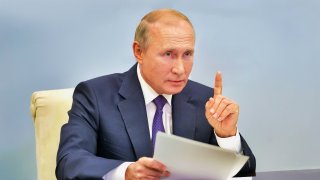Navalny's Legacy: Envisioning a Post-Imperial Russia Amidst Ukrainian Crisis
For the West, there is no long-term alternative to aiming for a post-imperial Russia—no matter how long it might take or how difficult it may be to achieve.
The death of Alexei Navalny on February 16 has prompted glowing praise of the prominent opposition leader’s courageous efforts to transform Putin’s Russia into a “normal country.” In their eulogies, commentators have rightly celebrated Navalny’s promotion of free and fair elections and his campaign against corruption among the Russian elite. Yet, as the invasion of Ukraine has made tragically clear, the normalization of Russia will require fundamental changes not only to its domestic political system but to its relationships with its neighbors and the international community more broadly.
Navalny’s views on foreign policy matters have been a subject of debate. Over the years, his statements about Ukraine often left him open to accusations of supporting the Putin regime’s imperialist project. Shortly after Russia’s annexation of Crimea in 2014, he declined to advocate for the peninsula’s return to Ukraine, stating in an interview with Echo Moskvy that Crimea “will remain part of Russia.” Later, after the establishment of a separate Ukrainian Orthodox church in 2018, Navalny lamented the split as a sign of the dissolution of the “Russian world”—one of Putin’s core ideological justifications for his invasion of Ukraine.
Many took these comments as proof of the old maxim, famously coined by Ukrainian writer and statesman Volodymyr Vynnychenko, that “the Russian liberal ends where Ukraine begins.” To a certain extent, such a critique of Navalny is valid. His apparent indifference toward Ukrainian sovereignty revealed a tendency to subscribe to the type of Russian chauvinist thinking that has fed the country’s aggression towards its neighbors, both now and in the past.
Yet, two significant caveats are in order. First, while Putin evidently intended to recreate the Soviet empire by force, Navalny always rejected the idea that “reunification should be achieved at the end of the barrel of a gun.” His focus lay instead on the right of ethnic Russians to choose their own future. Later on, in his 2014 Echo Moskvy interview, Navalny elaborated on his views on Crimea, asserting that the peninsula “belongs to the people who live in Crimea” and calling for a second, legitimate referendum on its status. Navalny’s belief in self-determination, rather than subjugation by force, also explained his previous insistence on fully implementing the Minsk Accords, which would have granted self-government to Russian-speaking populations in eastern Ukraine while guaranteeing the withdrawal of Moscow’s troops from the region.
This difference is by no means minor. Navalny’s emphasis on abiding by international norms—most importantly, the principle that using force to alter borders is illegitimate —demonstrated the prospect of an alternative future where Russia would behave predictably and responsibly towards its neighbors. The existence of such a Russia would finally make it possible to build a European security architecture rather than against Moscow, as Western leaders previously hoped might be the case following the collapse of the Soviet Union.
The second caveat concerns the progression of Navalny’s views over time. As the full extent of Putin’s aggressive ambitions became clear, Navalny’s rejection of Russian imperialism became more forceful. Following the February 2022 invasion of Ukraine, Navalny published an op-ed in The Washington Post arguing that “Russia must cease to be an instigator of aggression and instability” and condemning the country’s “self-generated imperial authoritarianism.” Navalny took this a step further in February 2023 by calling for Russia to respect Ukraine’s internationally recognized borders defined in 1991, implicitly changing course on the question of Crimea.
As the Human Rights Foundation’s Casey Michel noted at the time, Navalny’s shift on Crimea suggested the end of Russian liberals’ “years of trying to shunt the topic of Russian imperialism to the side.” This should offer encouragement about the possibility of a post-imperial Russia. For such a future to emerge, Russia’s opposition must decisively prove Vynnychenko’s adage wrong. In the last year of his life, Alexei Navalny took a big step in this direction.
Of course, Navalny did not represent all Russians. Support for Putin and the war against Ukraine remains high among Russian citizens despite the rising human and economic costs of the conflict. Moreover, the Kremlin’s ruthless crackdown on political opposition makes the scenario of a liberal such as Navalny coming to power difficult to imagine for the foreseeable future.
Nonetheless, Navalny succeeded in building an impressive opposition movement that stretched all across Russia. It was precisely this success that ultimately led to his death, presenting such a threat to the regime that Putin felt he had no option other than attempting to assassinate him, and when that failed, imprisoning Navalny in such abject conditions as to assure his demise. It is reasonable to believe that his personal evolution towards a clear rejection of Russian imperialism could inspire a significant segment of Russian society to follow his lead.
For the West, there is no long-term alternative to aiming for a post-imperial Russia—no matter how long it might take or how difficult it may be to achieve. Neither permanently isolating a country of 145 million people nor hoping for its dissolution is a viable strategy. The United States and Europe must, therefore, do their utmost to support Russian civil society leaders such as Navalny, who seek their country’s transformation. Moreover, following the war, Western leaders must avoid making claims about collective Russian guilt or supposed innate imperialist quality in the Russian national character—or else risk alienating their best hope for a different Russia.
About the Author: Nickolas Lokker
Nicholas Lokker is a Research Associate for the Transatlantic Security Program at CNAS. His work explores the development of the political and security order in Europe, focusing in particular on the integration and enlargement of the European Union as well as the evolving roles of Russia and the United States in the region. Follow him on X @lokker_n.
Image: Shutterstock.

